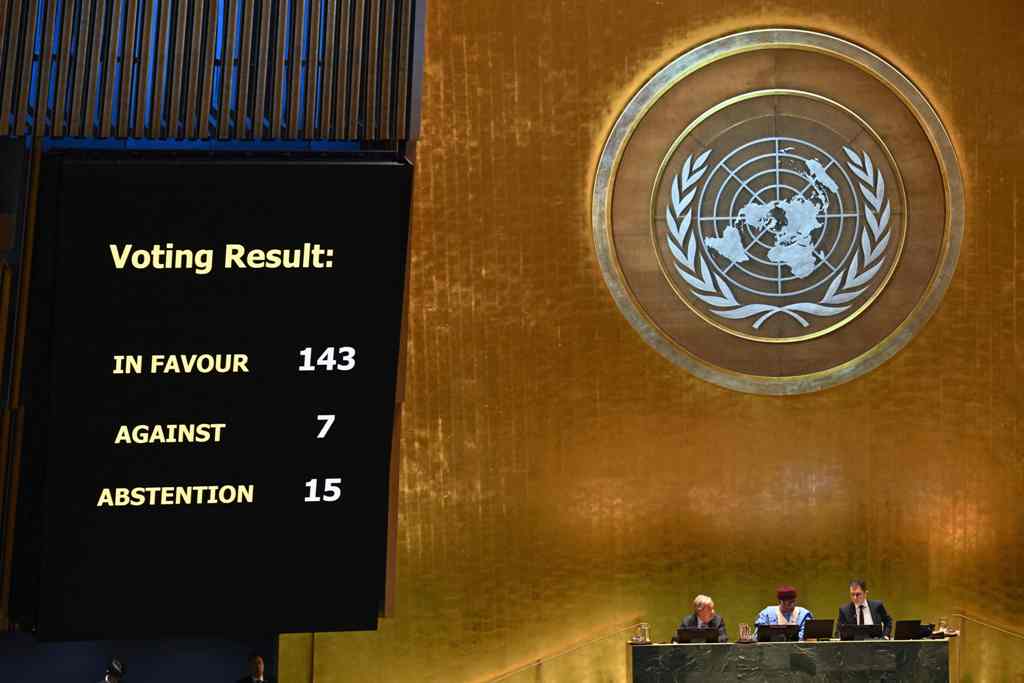
UNITED NATIONS (AFP) – UN members adopted a blueprint for the future on Sunday to tackle the myriad wars, environmental threats and technological challenges facing humanity that the global organisation hailed as “groundbreaking,” but critics panned as unambitious.
Secretary-General Antonio Guterres, who championed the “Pact for the Future,” hailed its “landmark agreements – a step-change towards more effective, inclusive, networked multilateralism.”
As an opener for the annual high-level week of the UN General Assembly, which begins Tuesday, dozens of heads of state and government gathered for the adoption, which faced last-minute opposition from Russia.
Leaders pledged to bolster the multilateral system to “keep pace with a changing world” and to “protect the needs and interests of current and future generations” facing “persistent crisis”.
“We believe there is a path to a brighter future for all of humanity,” the document says.
The pact outlines 56 “actions,” including commitments to multilateralism, upholding the UN Charter and peacekeeping.
It also calls for reforms to international financial institutions and the UN Security Council, along with renewed efforts to combat climate change, promote disarmament, and guide the development of artificial intelligence.
The adoption of the text faced a brief delay when Russia’s deputy minister of foreign affairs, Sergey Vershinin, introduced an amendment emphasizing the “principle of non-interference in the internal affairs of states.”
Russia’s objections were backed by allies Belarus, North Korea, Iran, Nicaragua and Syria, but its amendment was overwhelmingly dismissed in a motion to take no action.
I challenge you
Passage of the text was never a guarantee, and sources said Guterres had prepared three separate versions of his speech for the potential outcomes of the vote.
During the negotiations phase, the UN Secretary-General had urged nations to show “vision” and “courage,” calling for “maximum ambition” to strengthen international institutions that struggle to respond effectively to today’s threats.
But while there are some “good ideas,” the text “is not the sort of revolutionary document reforming the whole of multilateralism that Antonio Guterres had originally called for,” Richard Gowan of the International Crisis Group told AFP.
“Ideally, you would hope for new ideas,” said one diplomat.
The fight against global warming was one of the sticking points in the negotiations, with references to the “transition” away from fossil fuels having disappeared from the draft text weeks ago, before being re-inserted.
“The real test will be the delivery of these” goals, said environmental campaign group 350.org.
Despite criticism of the pact, it is still “an opportunity to affirm our collective commitment to multilateralism, even in the difficult current geopolitical context,” one diplomat said, emphasising the need to rebuild trust between the Global North and South.
“This pact gives us hope and inspiration for a better future,” said Sierra Leone’s President Julius Maada Bio, who has been a keen advocate for the Global South at the UN through his country’s membership of the Security Council.
Developing countries have been particularly vocal in demanding concrete commitments on the reform of international financial institutions, aiming to secure easier access to preferential financing, especially considering the impacts of climate change.
“This (existing) approach to governance reinforces the notion that it is acceptable to have first-class and second-class citizens,” said Barbados Prime Minister Mia Mottley.
Regardless of its content, the pact and its annexes – a Global Digital Compact and a Declaration on Future Generations – are non-binding, raising concerns about implementation, especially as some principles such as the protection of civilians in conflict are violated daily.


